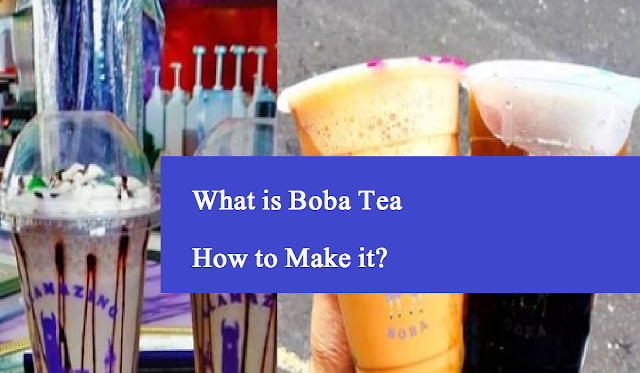What is Boba or Bubble Tea? How to Make Boba Tea?
Boba tea, also known as bubble tea, has become a international sensation, charming taste buds with its lovely mixture of flavors, textures, and playful aesthetics. Initiating in Taiwan in the 1980s, this exclusive drink has grown into a cultural wonder, with tea shops and enthusiasts around the world embracing its diverse range of options. In this article, we'll dive into the roots, elements, preparation, and the global popularity of boba tea.
1st Start of Boba Tea
The tale of Boba tea begins at Taiwan, where it was first concocted in the early 1980s. The original type of the beverage was a simple mixture of black tea, milk, sugar, and chewy tapioca pearls. The name "Bubble Tea" is said to have initiated from the foamy bubbles created by quaking or blending the tea mixture. Since years, the drink's popularity raised not only in Taiwan but over the world.
Essential of Bubble or Boba Tea
Boba tea is categorized by its varied and customizable elements,
making each cup a unique experience. The basic components include:
1.
Tea:
The basic element of Boba tea is often
black or green tea, but variations can include oolong, jasmine, or
fruit-flavored teas.
2.
Milk or Non-Dairy Alternatives:
Old-style Boba tea includes sweetened thick
milk or evaporated milk, but many modern versions offer alternatives like
almond milk, soy milk or coconut milk to cater to various dietary preferences.
3.
Sweeteners:
Sugar is added to sweeten the tea base, and the level of sweetness can often be adjusted according to individual requirements.
4.
Tapioca Pearls (Boba):
These small, rubbery spheres, made from
tapioca starch, are the unique element of Boba tea. They come in various
flavors, colors, and sizes, adding a delightful textural contrast to the drink.
5.
Ice:
Liable on personal preference, Boba or Bubble tea can be served hot or cold. The addition of ice gives it a refreshing quality, especially on warmer days.
How to Make Boba Tea
The preparation of boba tea includes a series of steps to ensure a
harmonious blend of flavors and textures:
Step.1.Brewing the Tea:
The chosen tea leaves are prepared to perfection, extracting the wanted
flavors. This step sets the foundation for the entire beverage.
Step.2 Sweetening the Tea:
After brewing, sugar is added to make it sweet. This step is vital,
as it determines the overall sweetness of the drink.
Step.3 Adding Milk or Alternatives:
The tea is combined with milk or non-dairy alternatives, creating a
creamy and moist base. This step also contributes to the characteristic frothy
bubbles.
Step.4 Tapioca Pearl Preparation:
Tapioca pearls are heated until they achieve the ideal chewy consistency. Once cooked, they are typically soaked in sweet syrup for added flavor.
Step.5 Assembly:
The tapioca pearls are added to the lowest of a cup, and the tea mixture is poured over them. The combination is then shaken or mixed to create the frothy bubbles that give boba tea its name.
Why Boba Tea Have World-wide Fame?
Boba tea has surpassed its Taiwanese origins to become a global phenomenon, with tea shops and cafes devoted exclusively to this delightful beverage. In major cities around the world, boba tea fans can explore a vast array of flavors and combinations.
The Social Experience of Boba Tea
Boba tea isn't just a beverage; it's a social experience. The common
aspect of enjoying boba tea with friends or family has contributed to its
widespread appeal. Tea shops often provide cozy atmospheres, encouraging
patrons to linger, chat, and savor their drinks. Social media has also played a
significant role in the global popularity of boba tea, with enthusiasts sharing
aesthetically pleasing photos and videos of their favorite concoctions.



No comments:
Post a Comment